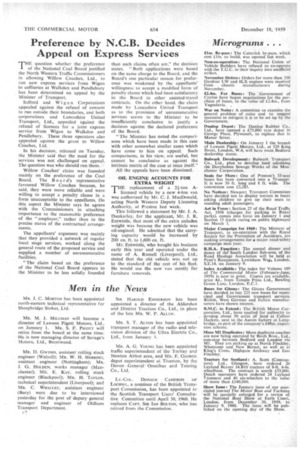Preference by N.C.B. Decides Appeal on Express Services
Page 40

If you've noticed an error in this article please click here to report it so we can fix it.
THE question whether the preference of the National Coal Board justified the North Western Traffic Commissioners in allowing Willow Coaches, Ltd., to run new express services from Wigan to collieries at Walkden and Pendlebury has been determined on appeal by the Minister of Transport.
Salford and Wigan Corporations appealed against the refusal of consent to run outside their boundaries, and both corporations and Lancashire United Transport, Ltd., appealed against the refusal of licences for a joint express service from Wigan to Walkden and Pendlebury. These three operators also appealed against . the grant to Willow Coaches, Ltd.
In his decision, released on Tuesday, the Minister said that the need for the services was not challenged on appeal. The question was who should run them.
Willow Coaches' claim was founded mainly on the preference of the Coal Board. The Boar d's representative favoured Willow Coaches because, he said, they were more reliable and were willing to accept a penalty clause in a form unacceptable to the appellants. On this aspect the Minister says he agrees with the Commissioners in attaching importance to the reasonable preference of the " employer," rather than to the precise status of the contractual arrangemen Is.
The appellants' argument was mainly that they provided a network of regular local stage services, worked along the general route of the proposed service and supplied a number of unremunerative•
"The claim based on the preference of the National Coal Board appears to the Minister to be less solidly founded than such claims often are," the decision states. "Both applications were based en the same charge to the Board, and the Board's one particular reason for preference was weakened by the appellants' willingness to accept a modified form of penalty clause which had been satisfactory to the Board in other assisted-travel contracts. On the other hand, the claim made by Lancashire United Transport as to the provision of unremunerative services seems to the Minister to be insufficiently conclusive to justify a decision against the declared preference of the Board.
"The Minister has noted the comparisons which have been made in this case with other somewhat similar cases which have come to him on appeal. Such comparisons, in his view, are useful, but cannot be conclusive as against the intrinsic merits of the case at issue itself."
All the appeals have been dismissed.
OIL ENGINE ACCOUNTS FOR EXTRA WEIGHT 'THE replacement of a 21--ton AL licensed vehicle by a new 4-ton van was authorized by Mr. C. J. MacDonald, acting North Western Deputy Licensing Authority, at Preston last week.
This followed a statement by Mr. J. A. Dunkerley, for the applicant, Mr. I. R. Entwistle, that most of the extra unladen weight was because the new vehicle was oil-engined. He admitted that the carrying capacity would be increased by 200 cu. ft. to 1,600 Cu. ft.
Mr. Entwistle, who bought his business early this year and operated under the name of A. Russell (Liverpool), Ltd., stated that the old vehicle was not up to the standard of the rest of his fleet. He would use the new van mostly for furniture removals.












































































































